The purported disappearance of NUP supporters has ignited a fierce debate, triggering an in-depth inquiry into the matter. Personally committed to unraveling the truth, I have exhaustively delved into these allegations, yet uncertainties persist.
Are these missing individuals merely products of imagination, or is there a more intricate scheme unfolding?
The controversy arose from NUP’s assertion that a substantial number of their supporters had vanished following alleged abductions, squarely attributing their disappearance to the government.
However, a significant shift in the narrative occurred when the Uganda Human Rights Commission (UHRC) investigated a list of thirty individuals highlighted in NUP’s petition. The stark disparity between the initial assertion of “thousands” and the confirmed count of “thirty” raises pertinent questions regarding accuracy versus embellishment.
In a recent development, President Yoweri Museveni wielded his constitutional authority to grant clemency to 130 convicted offenders, including NUP supporters detained on security-related charges.
While this act brought solace to the beneficiaries and their families, it was met with skepticism and ungratefulness from certain quarters. The failure to acknowledge the benevolence behind the pardon and the politicization of the situation jeopardize the prospects of national reconciliation and rehabilitation.
Challenging Ingratitude and misconceptions
The apparent lack of appreciation for the presidential pardon overlooks the broader context of previous pardons extended by President Museveni. By insinuating coercion, wrongful detention, or unwarranted leniency, critics neglect to grasp the intricacies of the judicial system and the genuine motives behind such acts of compassion. Recognizing the chance for redemption and the significance of progressing positively is paramount.
Amid the conflicting narratives and unresolved contentions, it is imperative for all stakeholders to collaborate in pursuit of clarity and closure. Instead of casting blame, a united effort to ascertain the whereabouts and well-being of all individuals is essential.
The government’s commitment to transparency and accountability should be reciprocated by proactive involvement from all concerned parties to ensure an equitable and just resolution.
As investigations progress, it emerges that some individuals linked to the alleged disappearances have departed the country under dubious circumstances, casting doubt on the veracity of their claims.
Instances of concocted narratives for personal gain underscore the criticality of distinguishing truth from falsehood and upholding integrity in the quest for justice. With a shared dedication to truth and ethical conduct, we can navigate through the intricacies of this issue and arrive at a meaningful resolution.

